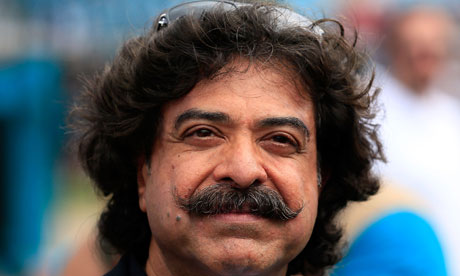
Shahid Khan, the owner of the Jacksonville Jaguars NFL franchise, has bought Fulham for a reported ?200m. Photograph: Sam Greenwood/Getty Images
Shahid Khan is perennially described as the living embodiment of the classic American dream, having landed in the country from Lahore at 16 to go to college and made himself, via the design of a truck bumper, a flamboyantly moustachioed billionaire. Mohamed Al Fayed said it when announcing his sale of charming Fulham football club to Khan, adding: "I met him twice prior to our successful transaction and have been very favourably impressed."
The statement from Khan, owner of the Jacksonville Jaguars NFL franchise, utilised the traditional language of English football club owners during the game's growth in the 20th century, promising: "I do not view myself so much as the owner of Fulham but a custodian of the club on behalf of its fans."
Quite what that actually means on the day he is becoming the club's owner is not explained. Nor did the man who has built a fortune from scratch in an arena as tough as the US automotive industry offer a clear explanation of why he is buying Fulham, for a reported ?200m. "Fulham is the perfect club at the perfect time for me" was all his statement said.
In such blandishments Khan has common ground with the other American owners of now six Premier League clubs ? almost a third of England's top league. Football, loved around the world, is here, in the land where it began 150 years ago, selling some of its most "storied" clubs to billionaires from the US, just about the only country which has never been entranced by the game.
As they have arrived, to own Manchester United, Liverpool, Arsenal, Aston Villa, Sunderland and now Fulham, these shrewd and calculating billionaires have rarely convincingly explained what is driving this gradual US takeover of our soccer. Khan at least avoided making a claim like that of Joel Glazer, when he bought Manchester United with his five siblings and ?525m of debt in 2005, that he was an "avid" fan of the club. Stan Kroenke, another NFL franchise holder who has steadily bought a controlling stake in Arsenal, has never said much about his motivation, beyond praising the club.
John Henry and Tom Werner of the Fenway Sports Group were more forthcoming, telling the Guardian that they knew almost nothing about football before they bought one of the game's legendary names, Liverpool, in 2010. Henry and Werner acknowledged they were greatly attracted by the huge money the Premier League makes selling its matches to payTV, here and overseas. There has been little from the MBNA credit card scion Randy Lerner and the private equity financier Ellis Short to suggest their purchases of historic Aston Villa and Sunderland respectively did not similarly have an eye on the money.
All are smart enough to acknowledge football's and their new club's heritage, as Khan did in his statement, and they are competent and successful business people, although from a different culture in which US sport has always talked of "owners". Here the word has crept in only recently, supplanting years in which the senior man at a football club was referred to as the chairman, whether he owned a majority of shares or not. We never really thought of football clubs being "owned", certainly not to make money. And this wholesale change has arrived with precious little debate about its implications.
Forbes, the magazine for the US rich, had a go at assessing Khan's plan, pondering how many "cross synergies" the American can "bank on" between the Jaguars and the Cottagers. It could make "strategic sense", Forbes said, as Khan is already trying to "leverage the overseas market" by bringing the Jaguars to Wembley for matches.
This is becoming a critical group now, six clubs of 20, takeovers never planned, barely explained. At the same time more football people are outspokenly lamenting the imbalance between the clubs as global investments and the weakness of the England team, representing a sport still organised country by country. The long-term implications of overseas, predominantly US, mostly financially acquisitive ownership have not been considered; the clubs have just been sold, one by one. The Premier League will see this deal as another handshake of approval, a sign of success. But no other European country is selling its football clubs like this. Germany, which brought two clubs to the Champions League final and played at Wembley to honour the birth of the game in England 150 years ago, scoffs and says it would never countenance it.
Source: http://www.guardian.co.uk/football/blog/2013/jul/12/fulham-us-takeover-english-football
Van Cliburn Sequester Miami Heat Harlem Shake Harlem Shake Miami Heat dr seuss History Channel The Bible alex smith
No comments:
Post a Comment
Note: Only a member of this blog may post a comment.